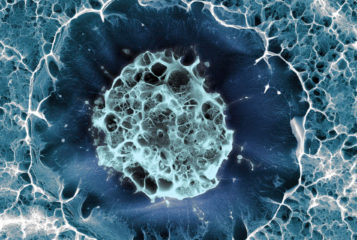A rare form of autism, caused by a mutation that alters amino acid metabolism, could potentially be treated with a nutritional supplement, according to an international team of researchers. This finding may also lead to an effective test for the condition using genetic biomarkers, helping earlier and more accurate diagnosis.
'This might represent the first treatable form of autism', Professor Joseph Gleeson of the University of California, San Diego, who led the study, said to the journal Nature. 'That is both heartening to families with autism, and also I think revealing of the underlying mechanisms of autism'.
Around a quarter of people with autism spectrum disorder also present with epilepsy. Researchers analysed the DNA of three families from the Middle East with children who have autism spectrum disorder with epilepsy, specifically focusing on the regions of their DNA that code for proteins. The children in question, who all had parents who were first cousins, carried a mutation in a gene called BCKDK.
BCKDK prevents the breakdown of specific amino acids, known as branched chain amino acids (BCAAs). These are essential amino acids that have to be obtained from our diet. The children with mutant BCKDK broke down these amino acids more quickly, leading to a deficiency.
Mice engineered to have the same genetic flaw, who had tremors and epileptic seizures, were given food supplemented with BCAAs. Their symptoms subsequently improved, leading scientists to posit whether supplementing the diet of the people with this particular mutation could also alleviate their symptoms.
'Studying the animals was key to our discovery', said lead author Dr Gaia Novarino of the University of California, San Diego. 'We found that the mice displayed a condition very similar to our patients, and also had spontaneous epileptic seizures, just like our patients. Once we found that we could treat the condition in mice, the pressing question was whether we could effectively treat our patients'.
Researchers showed that an over-the-counter supplement did reverse the amino acid deficiency in the autistic children, without causing any adverse effects. Future work will investigate whether the supplement can indeed reduce the patients symptoms of epilepsy and autism.
The type of autism addressed in the study is very rare and these particular results may not therefore be applicable to other forms of autism. However, studying other metabolic pathways may be of benefit, suggests Dr Daniel Geschwind, a neurogeneticist at the University of California, Los Angeles.
'If five or ten percent [of autism cases] are caused by metabolic disorders and there's a simple imbalance that one can correct with nutrition, that's something that human genetics will identify over the next five to ten years'.
The study was published in the journal Science.
Sources and References
-
Mutations in BCKD-kinase Lead to a Potentially Treatable Form of Autism with Epilepsy
-
Treating autism with dietary supplements
-
Amino-acid deficiency underlies rare form of autism
-
Rare Autism Form May Improve With Diet Change, Study Says
-
Nutritional Supplement Offers Promise in Treatment of Unique Form of Autism





Leave a Reply
You must be logged in to post a comment.